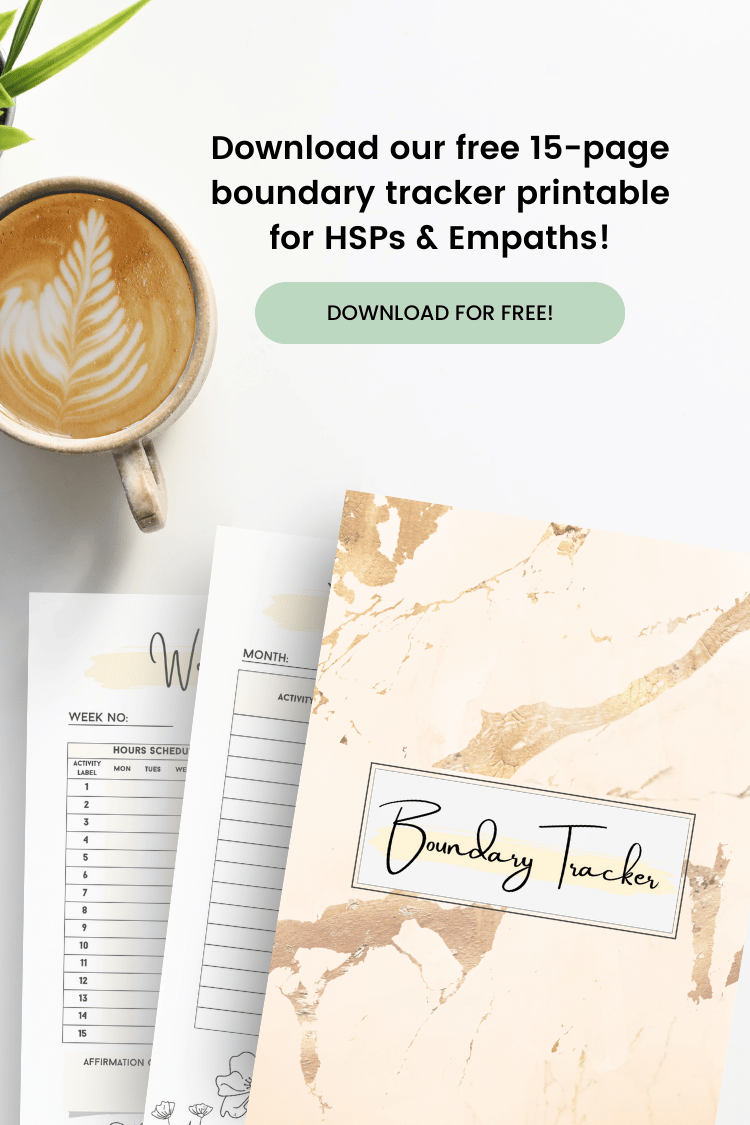Some highly sensitive people may reach to food or alcohol to self-soothe. In this guest article, HSP lifestyle coach Gretchen Bergantine provides valuable insights on the science behind self-soothing through food and alcohol and how to change your habits for the better.
Just a little heads up: some of the links in this blog are affiliate links, which means if you click on them and make a purchase, we may earn a small commission at no additional cost to you. 😊
We only recommend products and services we genuinely believe in and have personally used or researched. Your support through these links helps us keep bringing you valuable content, so thank you for being amazing!
Estimated reading time: 7 minutes
We all have those days, especially Highly Sensitive People. We come home from work overwhelmed and overstimulated from the day. Our nerves are fried, our brain is tired and we just want to turn off the “noise” from the day. For some of us, we come home and the overwhelm doesn’t end. The dog needs to be walked, you need to make dinner because everyone is hungry or you have to drive to your son’s volleyball game on the other side of town. When all we really want to do is hide, light a candle and let the day roll off of us into a hot epsom salt bath.
Does that sound familiar?
Highly Sensitive People tend to want to quiet the “noise” of this non-HSP friendly world, hide their emotions or they feel that they need to mask their sensitivity. For some of us, we bury our overwhelm, overstimulation and emotions in food or alcohol. And we may not even realize we’re doing it. What one might think are coping mechanisms are actually a behavior called emotional buffering.
Emotional Buffering is using external things to change how we feel emotionally. It’s taking something like alcohol, television, food, shopping or anything really- and using it to numb how we feel.
In this article, you’ll discover more about self-soothing through food or alcohol as a highly sensitive person.
Here’s What You’ll Learn:
Do You Use Emotional Buffers?
There are many reasons why we reach for the bottle of wine, that box of cookies or binge on Netflix for hours. It could be you struggle with boundaries and saying “no.” Afterall, HSPs tend to be people pleasers and don’t want to let others down, so we say “yes” to everything and everyone while saying “no” to ourselves.
Or maybe your perfectionism has reached a peak and you don’t even realize that you’ve been so self-critical that the only thing that seems to comfort you is half a pan of brownies.
You find yourself saying “I deserve this bottle of wine or box of cookies, etc. to calm down from my busy day!”
This causes you to numb out.
You repeat the cycle.
Which then turns your sensitive nervous system back into overdrive because you are flooding it with toxins in food or alcohol and not addressing the root cause of what’s driving your behaviors in the first place.
The Science
According to Elaine Aron, Highly Sensitive People become over aroused or overwhelmed easier than our non-HSP friends. We are also more prone to addictions to certain things, such as food, alcohol, shopping, etc.
Richard Schwartz, PhD. who developed the Internal Family Systems (IFS) model states that we have parts that serve the role of protectors- either managers or firefighters- who act to keep the exiles, or wounded parts of ourselves safe and protected.
Internal Family Systems is an evidence-based model used for personal healing and transformation. In his book No Bad Parts, Richard Schwartz, PhD. explains the assumption that we have many different parts- what can also be known as subpersonalities. This is normal and a natural part of being human. We also have our Core or Authentic Self which consists of innate qualities such as compassion, care and connection.
The act of numbing our senses becomes an act of survival rather than just a normal high.
For HSPs that struggle with alcohol, while it may seem to make the world more tolerable for us, that is just an illusion. It only worsens things when all is said and done. For example,if you are already stressed and struggling to get a peaceful sleep, alcohol only adds to your problems.

Cognitive Dissonance
Another factor to consider is Cognitive Dissonance.
Cognitive means the “way you think”. Dissonance means “disagreement.” So this literally means there’s a disagreement in your thinking. This is because your brain has many parts and they can come into conflict with one another. But what we’re really talking about is the conscious mind and the subconscious mind.
The conscious mind is everything you’re aware of.
An example would be you’re tired of waking up with a headache, or you’re tired of all the money you spend on booze, shopping, etc. Or perhaps you don’t recognize who you are anymore and you are sick of the cycle. You want to lose weight but you can’t because you’re on this endless hamster wheel of action and reactions.
The subconscious mind is a lifetime of stored memories, beliefs, programmed information and conditioning that you’re unaware of. Our subconscious mind controls our desires and emotions.
An example would be that you believe that drinking helps you relax and you formed that thought a long time ago after careful observation and experience. Through movies, watching parents, etc. you then experienced it yourself and found it to be true. This formed your belief that alcohol helps you relax
Cognitive dissonance happens when one of our subconscious beliefs disagrees with a conscious desire or decision.
What To Do Instead of the “Quick Fix” When You Want to Self-Soothe
- OWN WHAT YOU’RE FEELING – We all have hang-ups, habits and hurts. Start to sit with your feelings and really FEEL them. Thank them for what they are trying to teach you. Remember, emotions are messengers. What were you feeling that triggered your urge to want to self-soothe? Journal, dance, draw, whatever your body is telling you to allow yourself the freedom to feel.
- SHOW YOURSELF GRACE – Be gentle on yourself! I know sometimes our default setting as a highly sensitive is to be overly critical, judgemental and hard on ourselves. Show yourself love and compassion as you navigate these feelings and emotions.
- GET HELP FROM A PROFESSIONAL – Therapy and/or coaching is important for your journey to wellness, healing, transformation and self-care. Seek out a supportive community of like-minded people through coaches, Meet-ups, blog communities, etc. We can all learn from each other and let’s face it, we’re all in this world together!
There’s Good News!
Research shows that Highly Sensitive People are more impacted by difficult life experiences, trauma, burnout and/or spiritual crisis. However, we are more likely to respond to interventions through therapy and coaching and as a result are more likely to thrive and experience post-traumatic growth. We can refer to this as spiritual emergence through vantage sensitivity.
I recently did a blog post titled “A Guide To Mindful Eating” where you can start to be aware of your patterns. It’s about identifying the ROOT CAUSE and working through those “parts” of us that are really there to help us through life to become our true, authentic self.
Bottom line
Our nervous system can be our messenger, but it doesn’t have to be our manipulator.
Do you need help identifying the root causes of your need to self-soothe your sensitive nervous system? Reach out to HSP Lifestyle Coach Gretchen Bergantine here!








